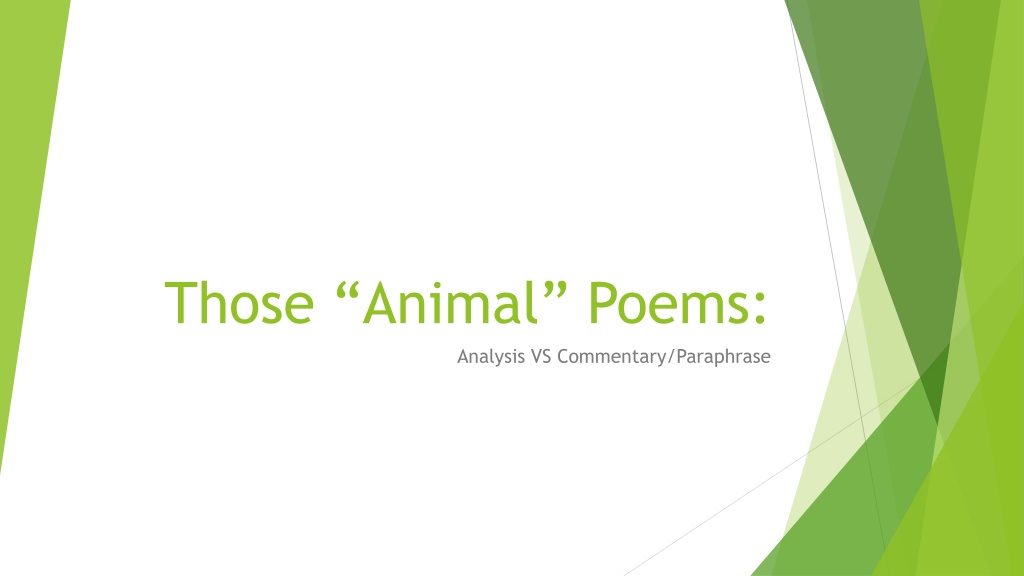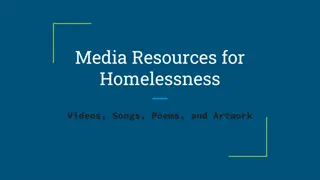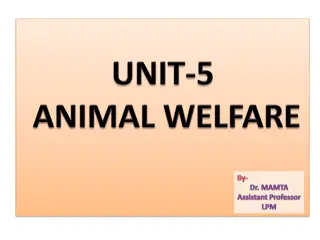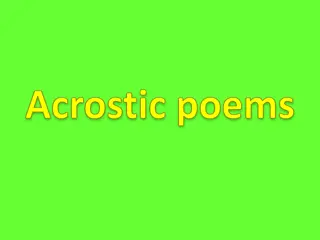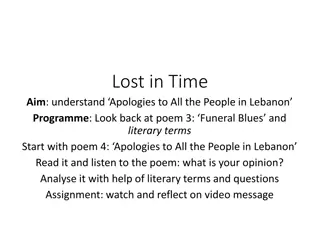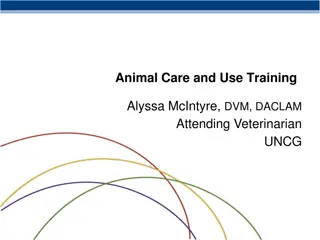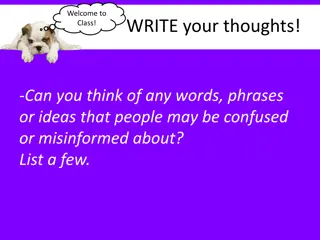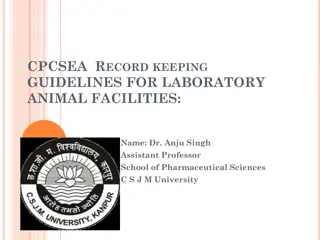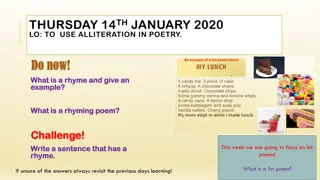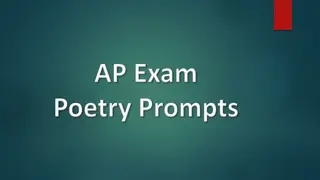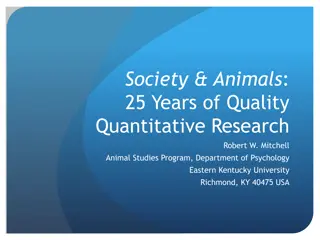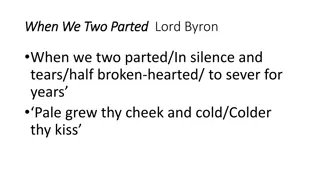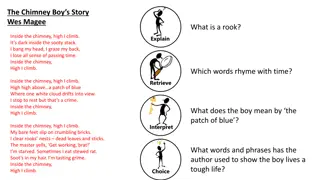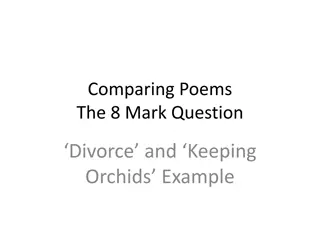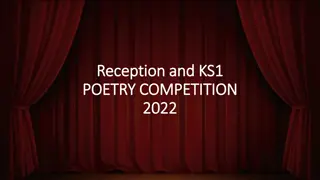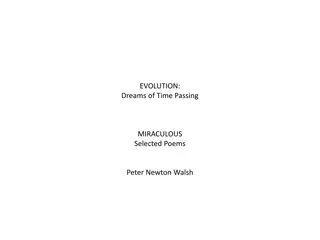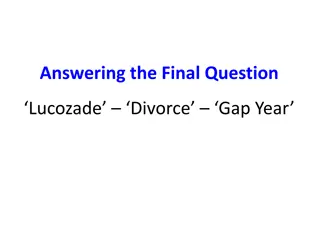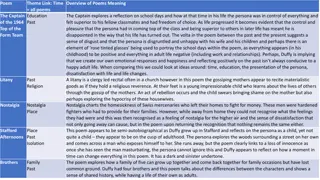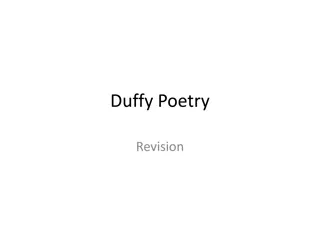Analysis and Commentary of Animal Poems
The analysis and commentary provided delve into the personalities of animals depicted in poems, focusing on the detailed characteristics and behaviors portrayed through the choice of words and literary devices. The distinction between analysis and commentary is explored through examples from poems like "Hawk Roosting" and "Golden Retrievals," emphasizing the intricate nuances and themes conveyed by each poet.
Download Presentation

Please find below an Image/Link to download the presentation.
The content on the website is provided AS IS for your information and personal use only. It may not be sold, licensed, or shared on other websites without obtaining consent from the author.If you encounter any issues during the download, it is possible that the publisher has removed the file from their server.
You are allowed to download the files provided on this website for personal or commercial use, subject to the condition that they are used lawfully. All files are the property of their respective owners.
The content on the website is provided AS IS for your information and personal use only. It may not be sold, licensed, or shared on other websites without obtaining consent from the author.
E N D
Presentation Transcript
Those Animal Poems: Analysis VS Commentary/Paraphrase
Which one is ANALYSIS? How/why? The hawk dreams, rehearse perfect kills and eat following in the exact path of his desires, thinking of no one else, it is all mine. The hawk is clearly used to having things his way and calling all the shots. If he was human some might say he is very type A personality. Each thought and word is used to express the exactness of his thoughts rather than waste time attempting to rhyme. The diction in Golden Retrievals is primarily monosyllabic, fog, balls, fetch, which conveys a pure simpleness about the speaker. Even the polysyllabic words bunny, bow-wow reflect a simpleness, joy, and light- heartedness in thought. This simplicity in thought translates into a simple view of the world.
How about these? The speaker of Hawk Roosting is arrogant. This is evident through words such as I or my that are used throughout the poem. This use of first person evokes the sense that the speaker is one to do everything on their own. The speaker states It took the whole of creation to produce my feet. This quote goes to show how this hawk acknowledges that creation took some time for other creation but with him specifically his feet are no ordinary feet and it took precision and an abundance of time to create him.
And these? When the speaker uses the words listed above, he is describing himself and his way of living. My manners are tearing off heads implies that the speaker believes his role is just to sleep, kill, and eat. Ever since he started on Earth that is all the hawk has ever learned/done so as he is preying on the Creation he reflects those feelings to the reader. The enjambment used in Golden Retrievals proves that the dog is carefree because it shows that his thoughts are all jumbled together. The poem goes from line to line with very few pauses, as seen in the first and second line when the dog says capture my attention/seconds at a time. The dog doesn t stop to think things through. He thinks as goes.
How about these? The sophisticated diction of the hawk demonstrates his intelligence. Through lengthy nouns, such as buoyancy, inspection, sophistry, and allotment, it s clear that the hawk does not have a simple mind and may even be trying to show off his eloquent vocabulary as he continuously uses personal possessive pronouns, like I, my, and mine to emphasize how the world revolves around him. These devices convey the ever present theme that humanity worries itself far too much, and reveal the blissfully simple life of the dog. Perhaps the most telling device is the stream of consciousness from which follows the dog s erratic attention span. This characterization highlights the speaker s true concern as the focuses on his owner. The dog s concerned, loving world view is also portrayed in the poems diction. Phrases like you re sunk in the past and you re off in some fog reveals that the dog s owner is his whole world, and conveys the sharp paradox between the dog and his owner.
Analyzing DICTION? Discuss: KINDS OF WORDS Pronouns? 1stperson? Personal 1stperson? ( I, ) Possessive 1stperson? ( my, mine ) Plural 1stperson? ( we ) 2ndperson? ( you, your ) 3rdperson? ( they, she, he ) Verbs? Active? Passive? Simple? Complex? Nouns? Specific? General? Concrete? Abstract? Adjectives? Harsh? Pleasant?
Syllabication? Monosyllabic words? Polysyllabic words? Alliteration? Assonance? Consonance? Harsh? Soft? Euphonious? Cacophonous? Simple? Complex? Whimsical?
Syntax? Inversion? Where are words placed? Why? First we eat. We eat first. Construction? Lots of phrases or clauses? The time has come. The time, now that I think about it, has come. Punctuation? Lots of interruptions? Question marks? Exclamations?
